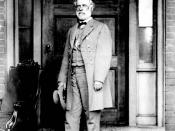�PAGE �
Durkheim Paper
Emile Durkheim would recognize that in light of these articles and his sociological theories, a religion had formed in the south out of the remembrance of the state of the Confederacy. By Durkheim's standards, the religion of the southern man would be the cause of the inconsistencies the south has in remembering the civil war, due to a failure of the state to fulfill its functions and educate its people.
The reason there are many areas in the southern United States that have different recollections of the civil war including pre and post war events, is because the confederacy has become a religion, with its own beliefs and practices, that which is sacred/profane, and totems (Durkheim [1912] 2003:90). Though it is not the majority of the population of the southern USA, much of the south has formed its own moral community with its origins in the Confederacy and the south.
This religion of the Confederacy, of the South, or of the "southern man", holds many beliefs; such as a belief in the southern man, a belief in state sovereignty, a belief that the south fought better than north, etc. (McPherson 3-5). There are practices as well, such as civil war reenactments, secession balls, parades, and even "a mock swearing-in of Jefferson Davis as president of the Confederacy" (Seeyle 1-3). Certain things are sacred in the south too; figures like General Robert E. Lee Jefferson Davis have been venerated and made sacred for the south. Furthermore there are sacred totems like the confederate flag. As there are sacred things so is there the profane, and to the southern religion it is anything "Yankee". Katharine Du Pre Lumpkin puts this in perspective,
"'One new set, I can recall, had, to be sure, lives of Lee and Jackson, but...


